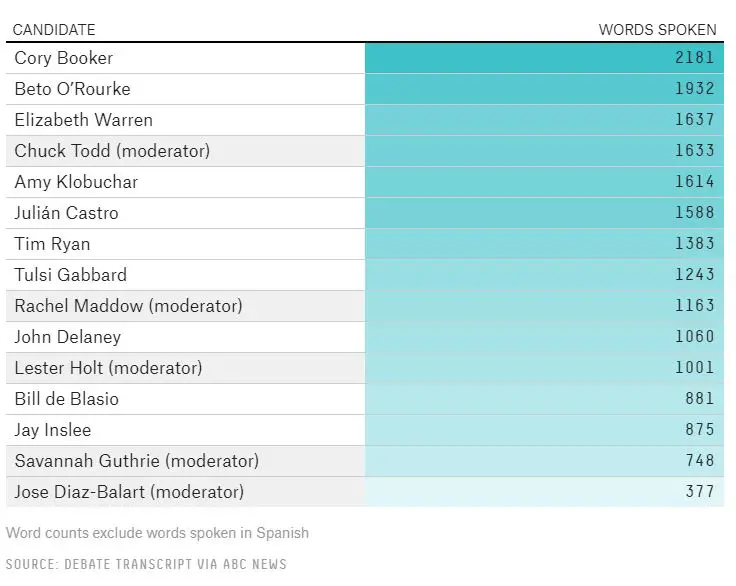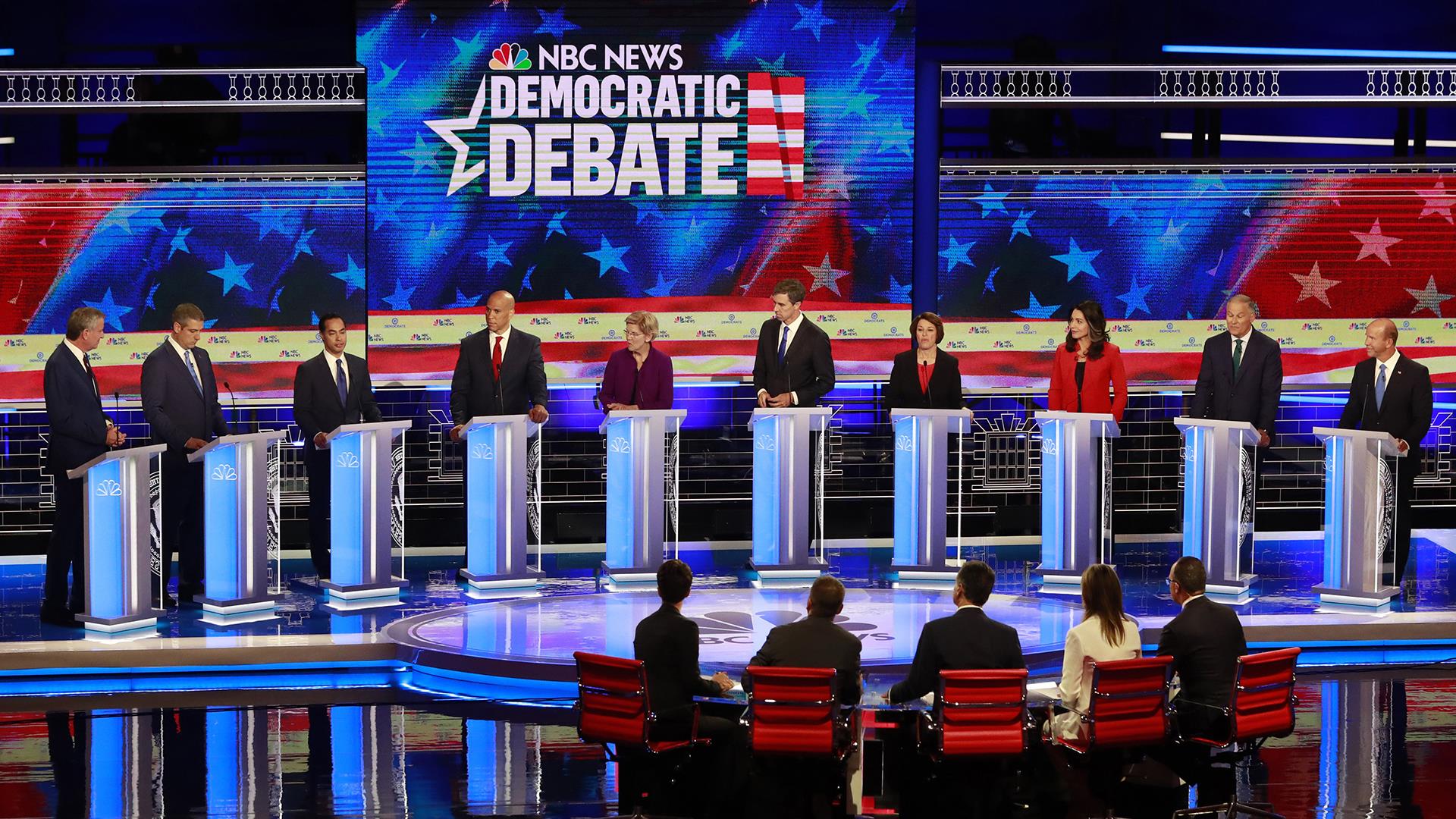Wednesday night gave us part one of the first Democratic debate kicking off the 2020 primary race. Tune in to watch part two tonight. Of the ten candidates on stage, there was a handful who clearly stood out and advanced the cause of their campaigns with strong answers and policy specifics. On the flipside, several candidates fell short or simply fell flat in their answers or their delivery.
Related: Watch Night One of the First Democratic Debate
As far as speaking time, Booker and O’Rourke got the most words in, though that doesn’t necessarily mean they were the right words.

Here’s a rundown on how each candidate faired and whether or not they may have moved the needed in getting some attention toward their campaign. I’ll start with the podium order, from left to right, just to keep things simple.
Candidates (From left to right on stage): Bill de Blasio, Tim Ryan, Julian Castro, Cory Booker, Elizabeth Warren, Beto O’Rourke, Amy Klobuchar, Tulsi Gabbard, Jay Inslee, John Delaney
Bill De Blasio – De Blasio had a few memorable moments, but he seemed to be the most interruptive candidate on stage. He interjected numerous times to try and make his points over other candidates. This can be helpful at times, but it can also be seen as rude to not allow other candidates to finish speaking in their allotted time. Overall, he probably didn’t do much to give voters a reason to consider him any further than they already have.
Tim Ryan – Ryan had his moments, and his strong suit was speaking about the loss of manufacturing jobs in his home state of Ohio. Ryan is a much more “traditional” Democrat, not necessarily subscribing to progressive orthodoxies like De Blasio or Warren. Overall, however, Ryan got lost in the mix and will probably not do all that much to garner more support for his candidacy.
Julian Castro – Castro is one candidate with a performance that likely piqued some interest in his campaign. He’s had some bright spots on the national scene, speaking at the 2012 Democratic national convention, but he faded quite a bit working in the Obama administration. However, Wednesday was a moment to shine, especially speaking on immigration. He was able to connect with viewers and make a case for his candidacy. According to analysis, his Google search volume spiked during and after the debate which is a decent measurement that could indicate interest in his campaign.
Cory Booker – Overall, Booker had a good night as well. He was ready to go on the economy, corporate consolidation, healthcare, and immigration. He provided answers for everything when asked and was able to defend his positions when challenged. His delivery was a little forced at times, though he seemed to be in his element and looked comfortable on stage. His answer on healthcare, basically tying it to many other issues like education and the economy, were probably some of his best lines.
Elizabeth Warren – Warren received the first question and took the ball to run with it. She’s ready for the bread-and-butter progressive issues and not afraid to push the envelope. There was a “show of hands” question asking which candidates would support ending private insurance. Only Warren and De Blasio raised their hand. This created a situation where Warren was able to explain why, in her opinion, private insurance for profit needed to be abolished. It was a way for her to make the case to voters who see that as a big step toward a government-run system and may shy away from going that far. While she didn’t have the highest number of spoken words, her answers were to the point without being overly wordy.
Beto O’Rourke – This was not Beto’s finest night. He had some moments, certainly, speaking on the topic of immigration, but he also lacked good answers on some policy specifics. When pinned down early on about whether he’d support a 70% tax rate on the highest income earners, O’Rourke would not commit to the number or provide one. Overall he played it safe to stay away from policy specifics, but that is probably his weakest spot as a candidate and he would’ve improved his standing with a little more substance rather than trying – and failing – to go for all style.
Amy Klobuchar – Klobuchar put in a solid performance, and was able to stand her moderate ground amid a sea of candidates with views to the left of her own. The one issue where she was prodded on was about whether she would decriminalize border crossings. She stuck to her ground and said immigration law should be a criminal matter and the laws should be enforced. this was in contrast to Julian Castro, and a few others, who want to decriminalize border crossings to a civil matter. She also said she doesn’t support “free college” other than free community college because it’s simply impractical and unaffordable.
Tulsi Gabbard – Gabbard is another candidate on the outskirts, like Castro, who had a good night and probably helped get some attention from viewers. Her Google searches also increased markedly during and after the debate. She had some weak answers early on, almost entirely sidestepping a question on the gender pay gap, but seemed to become more comfortable as the night went on.
Jay Inslee – As you can see from the chart, Inslee spoke the fewest words throughout the night, and when he did speak, he wasn’t very compelling. His argument boils down to his career as Governor of the state of Washington and saying that he has passed many of the policies at the state level that his colleagues want to introduce at the federal level. His big issue is climate change, and he made a point of that. However, it’s not enough to push his candidacy or move the needle in terms of support. Inslee won’t go much further than Tim Ryan.
John Delaney – When all is accounted for, Delaney actually had the best night he could have expected. He had some good answers and took his allotted time to speak carefully and tout his record as a center-left Congressman. He also interrupted a few times to get in on some issues, a technique he likely planned on doing ahead of time. It did give him some extra chances to speak and probably turned out better than De Blasio’s interruptions which were more boorish.
In the end, don’t take my word for it, watch the entire night one debate for yourself tell us what you think in the comments below.
Night two of the Democratic debate airs on NBC tonight at 9 pm ET (6 pm PT). Watch the live stream available here and follow the debate schedule at our Democratic debate schedule page.
Donate Now to Support Election Central
- Help defend independent journalism
- Directly support this website and our efforts
